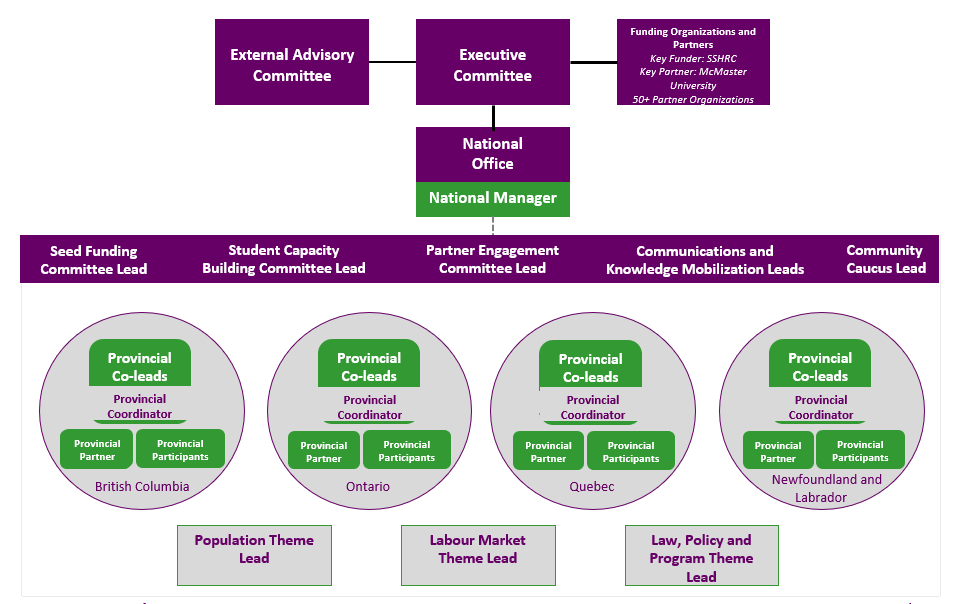CRWDP
Governance Structure
Click on the image to see the pdf version of the file (Click here for the text-based description of the CRWDP governance structure)
Text-based description of the CRWDP Governance Structure
Our governance structure consists of 2 primary committees-- an External Advisory Committee and the Executive Committee.
External Advisory Committee
The External Advisory Committee has five people from the Canadian and international work disability policy arena and the international academic community (Mike Feurestein (USA), Alex Collie (AU), Kerstin Ekberg (SW), Margaret Whitehead (UK), Patrick Loisel (CA)). Its mandate is to provide arms length advice on the relevance and quality of initiative activities (research, capacity building and knowledge mobilization), including current portfolios and future directions. It reviews initiative progress, timelines and target achievement (consistent with the Strategic Plan), with a focus on evaluation; advises on ways to sustain and expand activities within and beyond the 7-year time frame and provides linkages for international comparative endeavors. The committee meets once a year.
Executive Committee
The Executive Committee has 12 members—the initiative Director (Emile Tompa) and Co-director (Ellen MacEachen), and 10 members (Stephen Bornstein, Barb Neis, Rebecca Gewurtz, Normand Boucher, John Calvert, Mieke Koehoorn, Steve Mantis, Alec Farquhar, Abdou Saouab, Gail Fawcett). Its mandate is to oversee the initiative budget, ensure relevance and timelines of Initiative activities, plan the three national symposia, and plan the International Work Disability Policy Conference.
Provincial Clusters
There are 4 provincial clusters:
- British Columbia (BC),
- Ontario (ON),
- Quebec (QC), and
- Newfoundland and Labrador (NL)
with Provincial Co-leads (one from the workers’ compensation field and the other from disability policy studies). There are also cross cutting Thematic Leads, an Engagement Team and a Communications and Knowledge Mobilization Team.
Provincial clusters ensure research activities are sensitive to legislative, industrial, demographic and cultural contexts within a jurisdiction, though not all research is jurisdiction specific. Clusters also play a key role in student and new academic mentorship. Cross-cutting themes ensure that research activities within a broad area are complimentary and integrated. The provincial cluster co-leads for BC are Mieke Koehoorn and John Calvert, for ON Marcia Rioux and Rebecca Gewurtz, for QC Normand Boucher and Marie-José Durand, and for NL Barb Neis and Stephen Bornstein. Each cluster is supported by a quarter-time coordinator. The Thematic Leads are Mieke Koehoorn (Theme 1: Population analysis), Marcia Rioux (Theme 2: Labour-market analysis), and Normand Boucher (Theme 3: Law, policy, and program analysis). Clusters meet semi-annually, and the thematic groups quarterly.
Engagement Team
The mandate of the Engagement Team is to develop strategies for partnership engagement, work internships for people with disabilities, community-based research internships for students, and other engagement capacity building activities. Its lead is Alec Farquhar.
Communications and Knowledge Mobilization Team
The Communications and Knowledge Mobilization Team mandate is to develop and support knowledge exchange strategies with the injured worker and disability communities, work disability program policymakers, employers, the broader Canadian public, and international audiences. The team supports development of the quarterly e-newsletter Making It Work, digital stories of stakeholder experiences, and media releases; organization of the national symposia and the International Work Disability Policy conference; public reports, publication of books; preparation of annual reports; and development of an interactive, multi-layered, and broadly accessible website. The team lead is Ron Saunders (Director of Knowledge Transfer and Exchange, IWH) who is assisted by Cindy Moser (Manager of Communication, IWH) and four other members (from each provincial cluster). It includes a part-time web designer/programmer. It meets quarterly.
Accountability, Decision-making Authority and Issues Resolution: The governance structure is designed to ensure accountability and decision-making authority at all levels, while facilitating complementarity across various activities and consistency with the initiative strategic plan. Individual co-applicants ensure that their own research studies are compliant with ethics, privacy policies, research integrity, and intellectual property, and that own expenditures meet their university, McMaster University, and SSHRC requirements. Activity component leads oversee component activities and budgets and coordinate them through the Activity Oversight Committee. The Executive Committee has initiative oversight and is responsible for meeting initiative objectives and targets, while receiving arms length strategic guidance from the Advisory Committee. Memorandums of Understanding are also prepared by the Executive with each partner organization to clarify expectations, roles and responsibilities.


